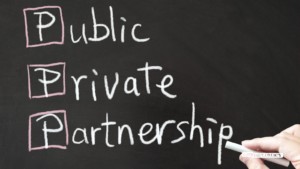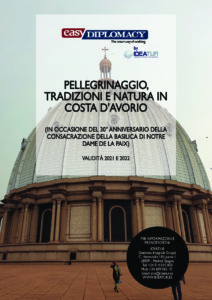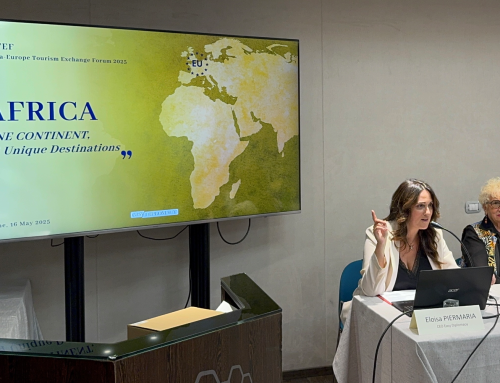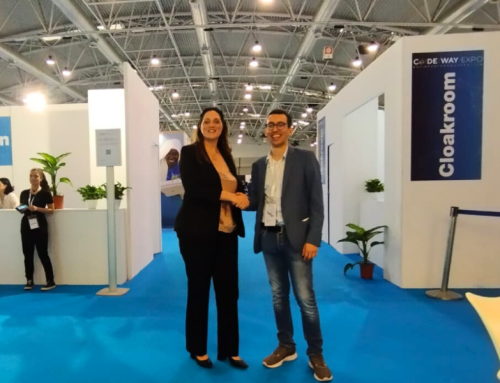The answer to the new Challenges of the Diplomatic World
Rome, 8th August 2022
Today’s challenges have two names: Time and Uncertainty
After two years of pandemic, an ongoing conflict with serious global implications and crises of various kinds on the horizon (climate, financial, food), difficulties and obstacles accumulate on each other, to the point of making us feel helpless and immobile while the clock eats up the seconds. Finding the right flywheel to restart becomes essential.
Officials of Embassies, Foreign Representations and International Organizations are aware of this. Indeed, Diplomacy’s scarcest resource is time, and its mission is the search for new political-economic opportunities for their Country.

When Officials are asked to perform an assignment, their stay in the destination lasts an average of three to four years. A period of time in which, in addition to managing the needs due to work and live in a foreign country, they need to achieve the goals assigned by their government and lay the foundations for long-term projects that they probably will not be able to complete, or carry on the work initiated by their predecessors.
Therefore, there are compelling needs such as the placement into a new working environment, the adaptation to social mechanisms that are different from one’s own, obstacles ranging from bureaucracy to local language and culture (cross culture), but also wide-ranging tasks, from the management of institutional relations to the search for economic opportunities for their country.
These are well-known challenges to the diplomatic world. However, there is a substantial difference from the past: challenges are placed within the spiral of uncertainty that characterizes today’s society.
Approaching and managing these difficulties ‘as usual’ is therefore not only ineffective but also anachronistic. Accelerators are needed to get the machine working again.
In other words, the timing of politics must be aligned with that of industry.
Outsourcing. What is it and how does it work for the PA?
The outsourced services for the Public Administration respond to the public sector’s need to achieve optimal results over a short time, by relying on those who, in the private sector, have the means and expertise to do so in the most efficient and effective way. A fitting example for the diplomatic world is CIBTvisas: a U.S. company that has been in business for more than 50 years and has headquarters in many countries around the world. CIBTvisas provides embassies with fast-track procedures to meet the growing demands for travel visas and passport processing, thus saving the Representations time and resources.
However, the outsourcing of services is not only about the processing of bureaucratic and consular procedures. It becomes an asset for Foreign Representations to quickly find solutions that meet the demands of their respective governments in the field of country promotion, search for investment, attraction of companies, and tourism promotion. The optimal solution is to identify a trusted intermediary who is familiar with the Italian bureaucratic and economic environment and who knows how to empathize with the diplomatic world at the same time.
Let’s take the tourism sector. In the aftermath of a two-year period characterized by the collapse of international travel, many countries need to restart by attracting as many visitors as possible, with an eye to new tourism models, different from the pre-pandemic ones. At the same time, many businesses in the sector are looking for new outlets to land in. At this point, the question arises: who is in charge of effectively designing a tourism project suited to the new needs of a country and finding the right companies to participate in it? Who is going to jump-start the sector?
A diplomatic official may not have the appropriate time or resources. They may not be fully familiar with the area on which they are called upon to operate. At the same time, companies may ignore what the country has to offer, because the message conveyed by the government runs into the ever-present stumbling block of bureaucracy and cultural differences.
How to overcome these obstacles effectively and quickly? The answer for us at Easy Diplomacy has always been one: Outsourcing – the task of designing a tailor-made project and searching for the right resources to achieve the objective is entrusted to an external professional who knows the supply and demand and actually matches them.
A long-term partnership: the PPP
 In 2015, the U.S. Embassy in Kazakhstan and Chevron Oil Company gave life to the “MakerSpaces” project in the cities of Almaty and Nur-Sultan, with the aim of facilitating, for young Kazakhstanis, the access to activities in the STEAM sectors (Science, Technology, Engineering, Arts and Mathematics). Spaces equipped with technological equipment where students and young professionals can work and study together to improve their skills. In 2020, the commitment was reconfirmed through a memorandum of understanding (MOU) that established “Makerspaces Expands!”, extending the offer to a total of ten Kazakh cities.
In 2015, the U.S. Embassy in Kazakhstan and Chevron Oil Company gave life to the “MakerSpaces” project in the cities of Almaty and Nur-Sultan, with the aim of facilitating, for young Kazakhstanis, the access to activities in the STEAM sectors (Science, Technology, Engineering, Arts and Mathematics). Spaces equipped with technological equipment where students and young professionals can work and study together to improve their skills. In 2020, the commitment was reconfirmed through a memorandum of understanding (MOU) that established “Makerspaces Expands!”, extending the offer to a total of ten Kazakh cities.
The collaboration between Chevron and the U.S. Embassy is an example of a public-private partnership (PPP) involving a diplomatic mission, obviously endorsed by the government. This type of partnership includes different models of cooperation and can be used in all cases where the aim is carrying out work for public benefit whose planning and implementation are entrusted to the private sector. The public sector, through long-term collaboration, can thus leverage the private sector’s tools, funding and expertise to achieve its goals, saving both time and energy by increasing efficiency. The private sector, in return, is in charge of the entire project management and gets all the benefits that come with it. A coffee company, for example, may take charge of redeveloping a depressed area of a country by employing local labor and developing crops that are socially and environmentally sustainable, keeping for itself the revenues from the sale of raw materials and processed products.
A public-private partnership, in other words, is a wide-ranging vision that places public and private objectives side by side, leveraging the capabilities and potential of both actors.
Il B2B as an opportunity for growth. A concrete example.
Business-to-Business has to do with  all those processes that bring companies together in the activities necessary for product development. At international level, it represents an important accelerator for the economic restart and for the development of many countries. Of course, it must be well organized to succeed.
all those processes that bring companies together in the activities necessary for product development. At international level, it represents an important accelerator for the economic restart and for the development of many countries. Of course, it must be well organized to succeed.
As far as the diplomatic world is concerned, one of the main tasks of the commercial-economic offices of an Embassy or Consulate is to set up delegations of entrepreneurs who can travel to their country and come into direct contact with local businesses, establishing useful ties to carry out win-win business projects. Moreover, the offer that the country shall propose to companies should be customized according to the needs of the companies themselves, and an experienced consultant should take care of profiling those companies beforehand. However, for B2B to be effective it takes more than the mere exchange of business cards. It must match ‘the right companies’, by industry, by common needs and goals.
In 2020, on the occasion of the 30th anniversary of the consecration of the Basilica of Notre Dame de la Paix in Yamoussoukro, Easy Diplomacy created a tourist product specific for the Ivory Coast, oriented to make the Basilica known as the “St. Peter of Africa”, a reference point for religious tourism for Europe and Italy as well, the center of worldwide Christianity.
The collaboration between Easy Diplomacy and the Ivorian Embassy to the Holy See focused primarily on the religious and cultural aspects of the project, identifying the key points necessary to give to the symbolic Basilica the appropriate positioning and around which to build a broader tourism development project for the country.
During the first exploratory trip, Easy Diplomacy accompanied a Spanish tour operator and ten priest tour leaders to the Ivory Coast to illustrate the tourism potential of the African country. Thanks to the issuance of visas facilitated for the occasion, the tour operator was able to reach the destination quickly, discover a new territory accompanied by the government, and make direct contact with local operators, signing agreements with them during a B2B event organized by the Ivorian government and by the local tourism office.
Immediately after the inspection trip (Fam Trip), the first religious and cultural tourism product linking Spain and Ivory Coast was thus created, a product that has now been launched on the European market. Thanks to the B2B event, the Spanish tour operator and Ivorian businesses had the opportunity to expand their range of action and their activities.
This is only the beginning.
The watchwords of the restart
The new challenges, as we have seen, are concrete problems, also for Diplomats. However, there are solutions to these problems and they answer to three watchwords: Outsourcing, Public Private Partnership, and B2B. They are all essential ingredients to jumpstart economies in a time of uncertainty. Today the public sector, and specifically the sector that includes Foreign Representations, can rely on these three opportunities to fulfill its mission and achieve its goals in an effective way.
There is only one last secret ingredient to get faster to the finish line: the courage to look beyond the obstacle to find the strenght to jump it.





